A Young Adult Caregiver Steps Up
How I found blessing through the costly journey of being my mother’s cancer caregiver.
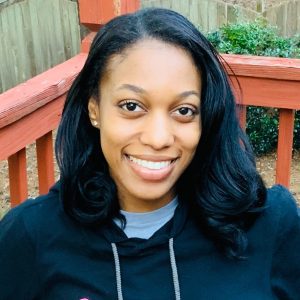
Finding out my mom had breast cancer shocked my family and me; it also thrust me into the unexpected role of being a young adult caregiver.
At the time, I didn’t know anything about being a caregiver or what it meant. I just knew that I wanted to be there for my mom, so I decided to step up.
It wasn’t even a question for me.
She is my ride or die, someone I would do anything for, my homie. We have a mutual understanding that no matter what, I have her back, and she has mine.
Yet, admittedly, I didn’t realize what being a caregiver would require.
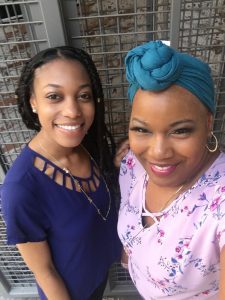
Her diagnosis
The doctors diagnosed her with ductal carcinoma insitu (DCIS), or stage 0 breast cancer, in December of 2017. I didn’t know what DCIS was, so I started researching it online and it brought tears to my eyes.
I just remember thinking, OK, so what do we do next?
In many ways, I felt like I had to grow up fast. Typically, I am reserved and quiet, while my mom lights up a room with her boisterous personality. Over time, though, I saw myself begin to change.
At doctor appointments, I became her advocate.
“What type of treatment do you think would be best for my mom?” I asked her doctor. Considering I had done my own research, I asked plenty of follow up questions, too.
I found a strength in me that I didn’t even knew I had.
Yet sometimes being a young adult caregiver proved a precarious balancing act.
My Balancing Act
At the time of my mom’s diagnosis, I was finishing up my senior year at Kennesaw State University. Along with attending classes and writing papers, I began helping schedule my mom’s doctor appointments, infusions, and keep track of when to take medications.
She also began sleeping in a recliner in my room, because my dad worked nights and the chair was one of the few places she could sleep comfortably after surgery.
Being a caregiver became a lot to handle, and admittedly I struggled, especially academically.
My mom insisted that I finish school; she didn’t want her cancer journey to derail my future.
And so, I pushed through. But my grades dropped, and my mind wandered constantly.
Sitting in psychology class on the afternoon of my mom’s mastectomy surgery, I remember watching the minutes drag by on the clock. I wanted to be there to support her, rather than listening to a lecture.
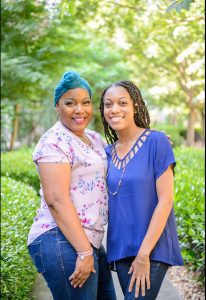
At my mom’s side
The next day, I flew from Atlanta to MD Anderson in Houston, which was a big deal for me because I had never flown by myself before. I was glad to be by my mom’s side to help her cope after surgery.
I helped her gently unravel the bandages around her chest so she could take a shower. It was a little strange being strong for the one who had always been so strong for me, but I was happy to be with her.
The time flew by and soon I returned to Georgia for school; meanwhile my mom stayed at MD Anderson.
A few days later, she called me, crying. The doctors told her that her cancer had spread and advanced to stage 1, and now she would need chemotherapy, which surprised both of us.
Soon tears streamed down my face, too, as the news brought home the reality that, indeed, my mom had cancer.
Facing chemo
Joining her at the infusion center was surreal.
Countless patients wrapped themselves in blankets to stay warm, as the air felt cold. A steady background noise of televisions filled the air, along with the siren beeps of several infusion machines.
I saw many people with cancer—elderly, middle aged and even some people my age. And now my mom was among them.
The nurses rushed from patient to patient and wore full hazmat gear to protect themselves from toxins in the medications, which unnerved me.
During the infusion, I iced my mom’s hands and feet to help prevent neuropathy. But really, just being there with her was probably the best help of all.
A lonely path
While I endeavored to be there for my mom, I sometimes wished that someone would have done the same for me. Being a caregiver can be a lonely journey.
A few people checked on me at times, but I wanted more support than I was getting.
I didn’t shelter myself completely; I still hung out with friends and went to dinner parties. And while some people asked about my mom, the conversations were often short as people couldn’t relate.
When I talked with others, it seemed like most people just wanted to hear the positive. I was already feeling the pressure to be strong, and not being able to share honestly only added to the pressure.
Loneliness is common among caregivers, but especially being a young adult caregiver increased the isolation, as none of my peers experienced the same role.
My mom’s journey also raised new fears for me. Now I will always have to answer “yes” at the doctor when they ask me about a family history of breast cancer.
I needed strength beyond myself to handle these pressures.
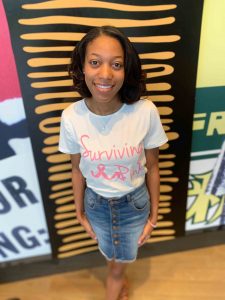
How I found hope, strength and peace
My relationship with God has often helped me through the toughest situations I have faced.
In the absence of having a caregiver of my own, the Lord cared for my needs.
I regularly prayed and journaled, which helped me find hope and strength. I wrote about what I felt, and I didn’t have to be positive or strong, I could just be real.
Reading the Bible also encouraged me, including this verse: “Rest in the Lord and wait patiently for him (Psalm 37:7).”
Throughout my mom’s journey, I waited on God. I knew he was in control, and so I put all my anxiety and fear and emotions on him.
At first, I was angry when my mom was diagnosed, but I continued to wait patiently, knowing that God would lead me, and lead my mom and I through this journey.
We still wait, as my mom’s journey is ongoing: she gets regular scans, takes daily pills, and gets monthly shots to prevent recurrence. To hear more of my mom’s story, which was also featured on Hope Has Arrived, read this article.
The blessings
Besides the challenges, being a young adult caregiver blessed me, too.
My mom and I were already close, but being her caregiver deepened our relationship. I always admired her strength and wit, but seeing her as a breast cancer warrior gave me a newfound respect for her.
Our experience with cancer also motivated us to help others facing a similar journey.
My mom and I co-wrote, Surviving Pink: An Inspirational Story of How a Breast Cancer Diagnosis Strengthened a Mother-Daughter Relationship. We also launched a website, advocate through social media and plan to write another book.
Being my mom’s caregiver also gave me direction for my future.
During one of my mom’s medical appointments, we met with an oncology social worker. She was so compassionate and genuine about helping others. Her caring spirit motivated me to want to do the same job.
And, so, currently I am pursuing my master’s degree in social work.
I am so grateful that I found this path.
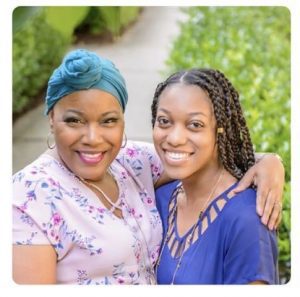
Advice for others
I would encourage other adults, and even young adults, too, to step up as caregivers if you have the chance. You will be blessed when you serve the ones you love.
However, I do want to caution people that you need to take care of yourself, and still live your life. I know that not every caregiver feels like they have a choice, but you do. And I want to encourage others to make the choice to do it.
Being a caregiver is a powerful role. As I have found, it revealed a strength in me I never knew and blessed me in a variety of ways including showing me my life’s path.
I believe that stepping up to serve others is always worth the cost.
Would you like to read another encouraging story? Check out At The End of My Rope.
For help on your cancer journey, read Fighting the Fear of Cancer or the Pathway to Hope.
I have a question or comment
How to find God’s hope, strength and peace

